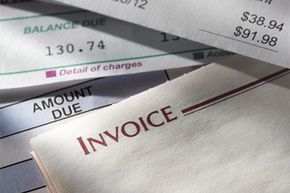 “You may want to consider filing for bankruptcy if you no longer know how much you owe your creditors.DNY59/Getty Images
“You may want to consider filing for bankruptcy if you no longer know how much you owe your creditors.DNY59/Getty Images
You cringe every time the phone rings, and it’s been days since you’ve checked the mail. Although you know you’re delaying the inevitable, it’s hard not to avoid the debt collectors who call and write. After all, what could you tell them that would make a difference? Now that your hours have been cut at work, you can’t afford to make the payments you owe, let alone the interest and fees that have been added on.
But how do you know if you should file for bankruptcy? One sure sign that you should consider bankruptcy is being unable to afford to pay your bills. If you have fallen behind on bills and cannot pay them, it’s time to take action. At this point, a bankruptcy can halt debt collectors and won’t do more damage to your credit report than all the late payments you’re racking up. Other signs to consider include:
- Only making minimum payments on credit cards
- Using credit cards to buy groceries or pay bills
- Feeling out of control when it comes to your finances, including not being sure how much you owe
- Contemplating debt consolidation
- Taking out title loans or payday loans
The most common types of personal bankruptcies under federal law are Chapter 7 and Chapter 13. A Chapter 7 bankruptcy will discharge your non-exempt debt. Non-exempt debt includes unsecured loans, such as credit cards, but in some cases will allow you to keep exemptions, such as a home loan or car loan. A Chapter 13 bankruptcy includes debt reorganization and allows debtors to retain their assets; it requires you to repay your debt according to a carefully orchestrated, court-approved budget and repayment plan. Keep in mind that if you’ve previously filed for bankruptcy, you are prevented from filing again for a period of years, depending on the chapter you elected to file [source: Adams].
To determine whether you are a good candidate for bankruptcy, roll up your sleeves and dig into your debt. Start by gathering credit card information, including balances and minimum payments. Can you make the minimum payments every month? No? Consider bankruptcy. Yes? Then keep digging. Add the total of your credit card debt to your other debt and compare this sum to your assets, such as savings accounts, real estate, vehicles, stocks, bonds and retirement accounts, if you have them. Do you owe more than you own? If so, you may be a good candidate for bankruptcy. Keep in mind, however, that some debt isn’t easy to shake. Student loans, while not impossible to have discharged during bankruptcy, are unlikely to be forgiven.
Consulting a lawyer about your particular situation before declaring bankruptcy is a wise measure. You’ll know soon enough whether bankruptcy will be the key to a fresh financial start [source: Atlas].
Lots More Information
Related Articles
- How Paying Off Student Loans Works
- How Debt Consolidation Works
- How to Shop for College Kids
- How Bankruptcy Works
- How Dealing With Debt Collectors Works
Sources
- Adams, Laura. "Should You File Bankruptcy?" Quick and Dirty Tips. Nov. 30, 2011. (Sept. 17, 2014) http://www.quickanddirtytips.com/money-finance/credit/should-you-file-bankruptcy
- Atlas, Janet. "Bankruptcy Basics: When Should You Throw in the Towel?" Legal Zoom. December 2009. (Sept. 17, 2014) https://www.legalzoom.com/articles/bankruptcy-basics-when-should-you-throw-in-the-towel



























